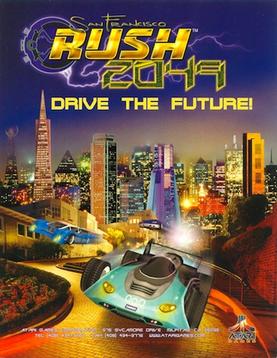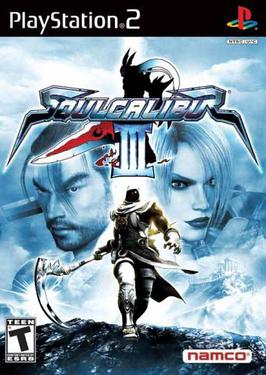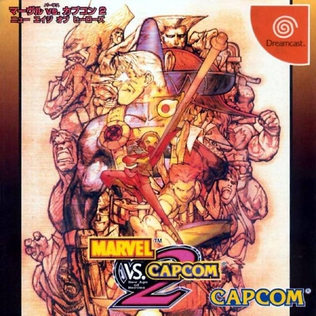
Quake III Arena is a 1999 multiplayer-focused first-person shooter developed by id Software. The third installment of the Quake series, Arena differs from previous games by excluding a story-based single-player mode and focusing primarily on multiplayer gameplay. The single-player mode is played against computer-controlled bots. It features music composed by Sonic Mayhem and Front Line Assembly founder Bill Leeb.

Soulcalibur is a weapon-based 3D fighting game developed by Project Soul and produced by Namco. It is the second game in the Soulcalibur series, preceded by Soul Edge in December 1995. Originally released in arcades on July 30, 1998, it ran on the Namco System 12 hardware. It was ported to the Dreamcast in 1999 with new features and improved graphics. The North American version was released in September 1999 as a launch game for the Dreamcast and was part of the successful launch of the new console. It became available as a downloadable title on the Xbox 360's Xbox Live Marketplace in July 2008 and it is forward compatible with the Xbox One along with the sequel, Soulcalibur II.

Soul Edge is a fighting game developed by the Namco team Project Soul and published by Namco as the first installment in the Soulcalibur series of 3D fighting games. Introduced at the JAMMA trade show in November 1995, the full arcade game was released in early 1996, while later in December an upgraded and expanded version of the game was ported to the PlayStation. The PlayStation version was renamed Soul Blade in North America, Europe, and Australia.

Ikaruga is a shoot 'em up developed by Treasure. It is the spiritual sequel to Radiant Silvergun (1998) and was originally released in Japanese arcades in December 2001. The story follows a rebel pilot named Shinra as he battles an enemy nation using a specially designed fighter called the Ikaruga which can flip between two polarities, black and white. This polarity mechanism is the game's key feature and the foundation for its stage and enemy design. All enemies and bullets in the game are either black or white. Bullets which are the same color as the player are absorbed while the others will kill the player. The game features both single-player and cooperative modes.

Pokémon Red Version and Pokémon Blue Version are 1996 role-playing video games (RPGs) developed by Game Freak and published by Nintendo for the Game Boy. They are the first installments of the Pokémon video game series. They were first released in Japan in 1996 as Pocket Monsters Red and Pocket Monsters Green, with the special edition Pocket Monsters Blue released in Japan later that year. The games were released as Pokémon Red and Pokémon Blue in North America and Australia in 1998 and Europe in 1999. Pokémon Red and Pokémon Blue combined Red, Green and Blue for release outside of Japan.

Pokémon FireRed Version and Pokémon LeafGreen Version are 2004 remakes of the 1996 role-playing video games Pokémon Red and Blue. They were developed by Game Freak and published by The Pokémon Company and Nintendo for the Game Boy Advance. FireRed and LeafGreen were first released in Japan in January 2004 and in North America and Europe in September and October 2004. The games are part of the third generation of the Pokémon video game series and hold the distinction of being the first enhanced remakes of previous games within the franchise.

Beyond Good & Evil is a 2003 action-adventure game developed and published by Ubisoft for PlayStation 2, Windows, Xbox and GameCube. The story follows the adventures of Jade, an investigative reporter, martial artist, and spy hitwoman working with a resistance movement to reveal a sinister alien conspiracy. Players control Jade and other allies, solving puzzles, fighting enemies, obtaining photographic evidence and, later in the game, travelling to space.

Soulcalibur II is a 2002 fighting game developed by Project Soul and published by Namco and the third installment in the Soulcalibur series of weapon-based fighting games. It is the sequel to Soulcalibur, which was released in July 1998. Originally intended to be released on Sega's NAOMI board, the game was released on the Namco System 246 arcade board before being ported to the PlayStation 2, GameCube, and Xbox in 2003.

Darwinia is a 2005 real-time tactics and real-time strategy video game for Microsoft Windows, Mac OS X and Linux. It is the second game developed by Introversion Software, and is set within a computer environment that simulates artificial intelligence. It received favourable reviews and won three awards at the 2006 Independent Games Festival. A multiplayer sequel, Multiwinia, was released for Windows in 2008. Darwinia and Multiwinia were released together as Darwinia+ for the Xbox 360 in 2010.

San Francisco Rush 2049 is a racing video game developed and manufactured by Atari Games for arcades. It was ported to the Nintendo 64, Game Boy Color, and Dreamcast by Midway Games West. The arcade machine was released in 1999; home versions followed in 2000 on September 7 for North America and November 17 for Europe. It is the third game in the Rush series and the sequel to San Francisco Rush: Extreme Racing and Rush 2: Extreme Racing USA. It is the last game in the Rush series to be set in the city of San Francisco and the last released on a Nintendo console. It also serves as the final game for the Atari Games label, which was retired shortly after the arcade release. The Dreamcast version was later re-released as part of Midway Arcade Treasures 3 for the PlayStation 2, Xbox, and GameCube and later for Microsoft Windows as part of Midway Arcade Treasures Deluxe Edition.

Numerous video games based on the Jurassic Park franchise have been released. Developers Ocean Software, BlueSky Software and Sega produced various games in 1993, coinciding with the first film, Jurassic Park. In 1997, several developers, including DreamWorks Interactive and Appaloosa Interactive, produced various games for nine different platforms to coincide with the release of the film The Lost World: Jurassic Park.

Soulcalibur III is a fighting video game produced by Namco as a sequel to Soulcalibur II and the fourth installment in the Soulcalibur series. It was originally released for the PlayStation 2 in 2005. An improved arcade version, Soulcalibur III: Arcade Edition, was released in 2006. It was the last Soulcalibur game to receive an arcade version, as IV onwards did not have an arcade release, and was also the last to be released by Namco as an independent company, as it would merge with Bandai's video game division to form Bandai Namco Entertainment in 2006. It is the second in the Soulcalibur series’ 1590 A.D. trilogy games, between II and IV.

Marvel vs. Capcom 2: New Age of Heroes is a crossover fighting game developed and published by Capcom. It is the fourth installment in the Marvel vs. Capcom series, which features characters from both Capcom's video game franchises and comic book series published by Marvel Comics. Originally released in Japanese arcades in 2000, the game received ports to the Dreamcast, PlayStation 2, PlayStation 3, Xbox, Xbox 360, and iOS devices over the span of twelve years.

T-MEK is a two-player, sit-down, virtual reality fighting arcade game developed and published by Atari Games in 1994.

Street Fighter V is a 2.5D fighting game developed by Capcom and Dimps and published by Capcom for PlayStation 4 and Windows in 2016. An arcade version exclusive to Japan was released by Taito in 2019.
Ludum Dare is a game jam competition. It was founded by Geoff Howland and was first held in April 2002. It is currently run by Mike Kasprzak, who has been part of the team since the beginning. Participants are required to create a video game that fits within a given theme in two or three days. Participants often release a time-lapse video of the development of their game.

Titan Souls is a 2015 action-adventure game developed by Acid Nerve and published by Devolver Digital. It was released for Windows, OS X, PlayStation 4, PlayStation Vita, and Android. Titan Souls received generally positive reviews and has been cited as an early example of a Soulslike, a game genre directly inspired by the Dark Souls series.
Dark Souls is a dark fantasy action role-playing game series developed by FromSoftware and published by Bandai Namco Entertainment. It began with the release of Dark Souls (2011) and has seen two sequels, Dark Souls II (2014) and Dark Souls III (2016). The series was created by Hidetaka Miyazaki and has received critical acclaim, with its high level of difficulty being among its most discussed aspects, while the first Dark Souls is often cited as one of the greatest games of all time. By 2023, the series had shipped over 35 million copies outside of Japan. Other FromSoftware games, including Demon's Souls, Bloodborne, Sekiro: Shadows Die Twice, and Elden Ring, share several related concepts and led to the creation of the Soulslike subgenre.

Octogeddon is an action-strategy video game with elements of roguelike games developed by All Yes Good. It was released for Microsoft Windows in February 2018 and Nintendo Switch in 2019. The player controls an octopus who is seeking vengeance against humanity. It fights using tentacles that can be upgraded between each stage.

Inscryption is a 2021 roguelike deck-building game developed by Daniel Mullins Games and published by Devolver Digital. Directed by Daniel Mullins, it was originally released for Windows on October 19, 2021, and on Linux, macOS, PlayStation 4, PlayStation 5, Nintendo Switch, Xbox One and Xbox Series X/S over the following two years. The game puts the player in a cabin where a mysterious gamemaster makes them play a tabletop game.


















